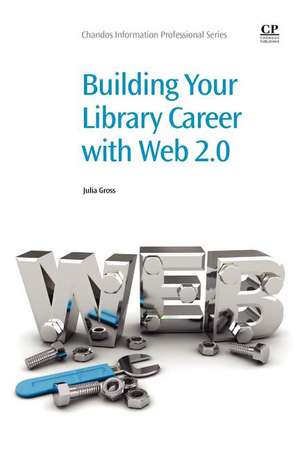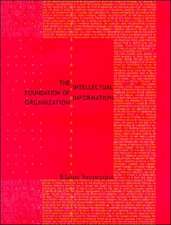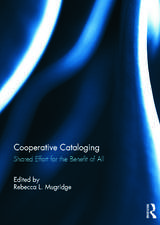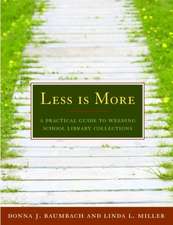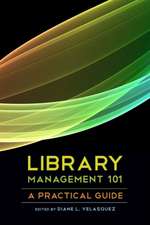Building Your Library Career with Web 2.0: Chandos Information Professional Series
Autor Julia Grossen Limba Engleză Paperback – 8 noi 2011
- Provides fresh ideas on building networks to survive and thrive in the digital career space
- Covers the risks and opportunities of having an online presence
- Provides a Web 2.0 toolkit for independent learning
Din seria Chandos Information Professional Series
- 15%
 Preț: 403.64 lei
Preț: 403.64 lei - 33%
 Preț: 334.02 lei
Preț: 334.02 lei - 23%
 Preț: 361.88 lei
Preț: 361.88 lei - 19%
 Preț: 394.21 lei
Preț: 394.21 lei - 23%
 Preț: 377.88 lei
Preț: 377.88 lei - 28%
 Preț: 367.13 lei
Preț: 367.13 lei - 8%
 Preț: 337.71 lei
Preț: 337.71 lei - 23%
 Preț: 325.93 lei
Preț: 325.93 lei - 23%
 Preț: 367.21 lei
Preț: 367.21 lei - 23%
 Preț: 326.43 lei
Preț: 326.43 lei - 32%
 Preț: 422.53 lei
Preț: 422.53 lei - 23%
 Preț: 372.11 lei
Preț: 372.11 lei - 28%
 Preț: 373.77 lei
Preț: 373.77 lei - 8%
 Preț: 330.60 lei
Preț: 330.60 lei - 27%
 Preț: 370.18 lei
Preț: 370.18 lei - 19%
 Preț: 393.76 lei
Preț: 393.76 lei - 38%
 Preț: 368.60 lei
Preț: 368.60 lei - 8%
 Preț: 328.42 lei
Preț: 328.42 lei - 23%
 Preț: 616.37 lei
Preț: 616.37 lei - 19%
 Preț: 366.90 lei
Preț: 366.90 lei -
 Preț: 392.65 lei
Preț: 392.65 lei - 22%
 Preț: 328.93 lei
Preț: 328.93 lei - 8%
 Preț: 331.20 lei
Preț: 331.20 lei - 23%
 Preț: 373.17 lei
Preț: 373.17 lei - 23%
 Preț: 374.30 lei
Preț: 374.30 lei - 22%
 Preț: 356.63 lei
Preț: 356.63 lei - 8%
 Preț: 342.95 lei
Preț: 342.95 lei - 28%
 Preț: 325.36 lei
Preț: 325.36 lei - 8%
 Preț: 358.54 lei
Preț: 358.54 lei - 38%
 Preț: 373.68 lei
Preț: 373.68 lei - 22%
 Preț: 329.69 lei
Preț: 329.69 lei - 28%
 Preț: 369.40 lei
Preț: 369.40 lei - 8%
 Preț: 325.36 lei
Preț: 325.36 lei - 27%
 Preț: 439.49 lei
Preț: 439.49 lei - 33%
 Preț: 304.61 lei
Preț: 304.61 lei - 28%
 Preț: 361.88 lei
Preț: 361.88 lei - 8%
 Preț: 327.54 lei
Preț: 327.54 lei - 23%
 Preț: 366.78 lei
Preț: 366.78 lei -
 Preț: 351.34 lei
Preț: 351.34 lei - 8%
 Preț: 367.13 lei
Preț: 367.13 lei - 8%
 Preț: 326.22 lei
Preț: 326.22 lei - 19%
 Preț: 394.08 lei
Preț: 394.08 lei - 23%
 Preț: 373.86 lei
Preț: 373.86 lei - 8%
 Preț: 327.98 lei
Preț: 327.98 lei - 8%
 Preț: 326.24 lei
Preț: 326.24 lei - 8%
 Preț: 328.42 lei
Preț: 328.42 lei - 8%
 Preț: 326.68 lei
Preț: 326.68 lei - 8%
 Preț: 326.51 lei
Preț: 326.51 lei - 23%
 Preț: 374.73 lei
Preț: 374.73 lei
Preț: 409.07 lei
Nou
Puncte Express: 614
Preț estimativ în valută:
78.27€ • 81.72$ • 64.78£
78.27€ • 81.72$ • 64.78£
Carte tipărită la comandă
Livrare economică 05-19 aprilie
Preluare comenzi: 021 569.72.76
Specificații
ISBN-13: 9781843346517
ISBN-10: 1843346516
Pagini: 236
Dimensiuni: 156 x 234 x 13 mm
Greutate: 0.34 kg
Editura: ELSEVIER SCIENCE
Seria Chandos Information Professional Series
ISBN-10: 1843346516
Pagini: 236
Dimensiuni: 156 x 234 x 13 mm
Greutate: 0.34 kg
Editura: ELSEVIER SCIENCE
Seria Chandos Information Professional Series
Cuprins
List of figures and tables
Preface
Acknowledgements
About the author
Chapter 1: Web 2.0 and your library career
Abstract:
Technology and the core business of libraries
Our technological past and future
What is Web 2.0?
Why should LIS professionals be interested in Web 2.0?
What are the key features of Web 2.0 that make it useful in careers?
What are the risks and pitfalls of Web 2.0?
Web 2.0 and the workplace generally
Cornerstones of career development
Conclusion
Chapter 2: Social networking sites and your library career
Abstract:
Social networking overview
What is social networking software?
What is social media?
The rise and rise of social networking
Drivers of social networking growth
What is so revolutionary about social networking software?
Why should librarians be interested in social networking?
What are the main issues or problems with social networking?
LinkedIn
Facebook
Twitter
Getting started on the social networking checklist
Conclusion
Chapter 3: Using Facebook, LinkedIn and Twitter for your career
Abstract:
Facebook
LinkedIn
Twitter
Chapter 4: Personal marketing for your career
Abstract:
What is marketing and why do you need to know about it?
How do you apply marketing principles to your career?
How do you start to develop a personal brand?
Personal brand self-assessment checklist
Developing a personal brand as an early-career professional
Marketing: the four Cs
Web 2.0 tools for developing a personal brand
Web 2.0 tools for eportfolios
Importance and benefits of marketing
Conclusion
Chapter 5: Privacy, social networking and your career
Abstract:
Why is privacy important?
What has changed to make online privacy an issue now?
Are there generational differences in attitudes to privacy?
Who is responsible for ensuring online privacy?
What is the history of privacy erosion in the online world?
Privacy and your career
Privacy and Facebook
Privacy and Google
Digital footprint
How to monitor your digital footprint
Google Alerts
FAQs and actions for online privacy
Government agencies providing support for privacy
Tracking privacy changes on social networking sites
Conclusion
Chapter 6: Lifelong learning and your career
Abstract:
Career paths and new roles in LIS
What is lifelong learning?
Lifelong learning and student graduate attributes
Strategies for becoming a lifelong learner
RSS (Really Simple Syndication)
RSS feed readers
Sources of RSS feeds
How to subscribe to RSS feeds
Managing your RSS feeds
Start pages
iGoogle start page
Web widgets and gadgets
Step by step: setting up iGoogle
Netvibes
Yahoo! Pipes
Conclusion
Chapter 7: Web 2.0 professional development for your library career
Abstract:
LIS professional organisations and professional development
New ways of delivering professional development
LIS conferences and their career advantages
Getting the most out of conference attendance
Post-conference reflection
Conferences in the time of Web 2.0
The conference backchannel
The unconference
23 things and the Learning 2.0 Programme
Accessing the Learning 2.0 Programme as an independent learner
List of 23 things from University of Cambridge Library
Devices and gadgets: learning through play
YouTube for professional development
Open education courseware
Webinars
WebJunction
Conclusion
Chapter 8: Networking for your LIS career
Abstract:
Why do you need to network?
Networks for career support
Networks for career influence
Learning networks and your career
Connectivism and learning networks
‘I store my knowledge in my friends’
Personal learning networks (PLNs)
How do you cultivate a network?
Tips for cultivating networks:
Cloud computing
Wikis for networking
Google Groups for networking
Yammer for networking
LinkedIn for networking
Conclusion
Chapter 9: E-mentoring for career development
Abstract:
What is mentoring?
What does a mentor do?
Benefits of mentoring in the workplace
Formal mentoring
Informal mentoring
E-mentoring
E-mail for e-mentoring
Finding a mentor
Characteristics of a successful e-mentoring relationship
Thinking outside the box, peer mentoring and non-library mentors
Online networks for mentoring contacts
Conclusion
Chapter 10: Keeping up to date and being competent
Abstract:
Information overload
Coping with information overload
Library and Web 2.0 blogs
SlideShare for staying up to date
RSS for staying up to date
Twitter for staying up to date
Social bookmarking
Tag or word clouds
Housekeeping and keeping track of passwords
Social media competencies for LIS professionals
Conclusion
Bibliography
Index
Preface
Acknowledgements
About the author
Chapter 1: Web 2.0 and your library career
Abstract:
Technology and the core business of libraries
Our technological past and future
What is Web 2.0?
Why should LIS professionals be interested in Web 2.0?
What are the key features of Web 2.0 that make it useful in careers?
What are the risks and pitfalls of Web 2.0?
Web 2.0 and the workplace generally
Cornerstones of career development
Conclusion
Chapter 2: Social networking sites and your library career
Abstract:
Social networking overview
What is social networking software?
What is social media?
The rise and rise of social networking
Drivers of social networking growth
What is so revolutionary about social networking software?
Why should librarians be interested in social networking?
What are the main issues or problems with social networking?
Getting started on the social networking checklist
Conclusion
Chapter 3: Using Facebook, LinkedIn and Twitter for your career
Abstract:
Chapter 4: Personal marketing for your career
Abstract:
What is marketing and why do you need to know about it?
How do you apply marketing principles to your career?
How do you start to develop a personal brand?
Personal brand self-assessment checklist
Developing a personal brand as an early-career professional
Marketing: the four Cs
Web 2.0 tools for developing a personal brand
Web 2.0 tools for eportfolios
Importance and benefits of marketing
Conclusion
Chapter 5: Privacy, social networking and your career
Abstract:
Why is privacy important?
What has changed to make online privacy an issue now?
Are there generational differences in attitudes to privacy?
Who is responsible for ensuring online privacy?
What is the history of privacy erosion in the online world?
Privacy and your career
Privacy and Facebook
Privacy and Google
Digital footprint
How to monitor your digital footprint
Google Alerts
FAQs and actions for online privacy
Government agencies providing support for privacy
Tracking privacy changes on social networking sites
Conclusion
Chapter 6: Lifelong learning and your career
Abstract:
Career paths and new roles in LIS
What is lifelong learning?
Lifelong learning and student graduate attributes
Strategies for becoming a lifelong learner
RSS (Really Simple Syndication)
RSS feed readers
Sources of RSS feeds
How to subscribe to RSS feeds
Managing your RSS feeds
Start pages
iGoogle start page
Web widgets and gadgets
Step by step: setting up iGoogle
Netvibes
Yahoo! Pipes
Conclusion
Chapter 7: Web 2.0 professional development for your library career
Abstract:
LIS professional organisations and professional development
New ways of delivering professional development
LIS conferences and their career advantages
Getting the most out of conference attendance
Post-conference reflection
Conferences in the time of Web 2.0
The conference backchannel
The unconference
23 things and the Learning 2.0 Programme
Accessing the Learning 2.0 Programme as an independent learner
List of 23 things from University of Cambridge Library
Devices and gadgets: learning through play
YouTube for professional development
Open education courseware
Webinars
WebJunction
Conclusion
Chapter 8: Networking for your LIS career
Abstract:
Why do you need to network?
Networks for career support
Networks for career influence
Learning networks and your career
Connectivism and learning networks
‘I store my knowledge in my friends’
Personal learning networks (PLNs)
How do you cultivate a network?
Tips for cultivating networks:
Cloud computing
Wikis for networking
Google Groups for networking
Yammer for networking
LinkedIn for networking
Conclusion
Chapter 9: E-mentoring for career development
Abstract:
What is mentoring?
What does a mentor do?
Benefits of mentoring in the workplace
Formal mentoring
Informal mentoring
E-mentoring
E-mail for e-mentoring
Finding a mentor
Characteristics of a successful e-mentoring relationship
Thinking outside the box, peer mentoring and non-library mentors
Online networks for mentoring contacts
Conclusion
Chapter 10: Keeping up to date and being competent
Abstract:
Information overload
Coping with information overload
Library and Web 2.0 blogs
SlideShare for staying up to date
RSS for staying up to date
Twitter for staying up to date
Social bookmarking
Tag or word clouds
Housekeeping and keeping track of passwords
Social media competencies for LIS professionals
Conclusion
Bibliography
Index
Recenzii
"This is a very practical guide, providing a good background in social-media technology along with some hands-on suggestions to get you started. Well researched and grounded in evidence, Gross strikes a good balance between theory and functional aspects, so there is something for everyone." --The Australian Library Journal, Vol. 62, No. 3, 2013
"Written in an informal style, this practical guide is suited to both new and established LIS professionals who are unfamiliar with this subject area." --An Leabharlann: The Irish Library
"A great deal of detailed information is presented about Web 2.0 technologies with direct professional relevance, including explanations, step by step instructions, useful web links and practical examples." --Australian Academic & Research Libraries
"Written in an informal style, this practical guide is suited to both new and established LIS professionals who are unfamiliar with this subject area." --An Leabharlann: The Irish Library
"A great deal of detailed information is presented about Web 2.0 technologies with direct professional relevance, including explanations, step by step instructions, useful web links and practical examples." --Australian Academic & Research Libraries
